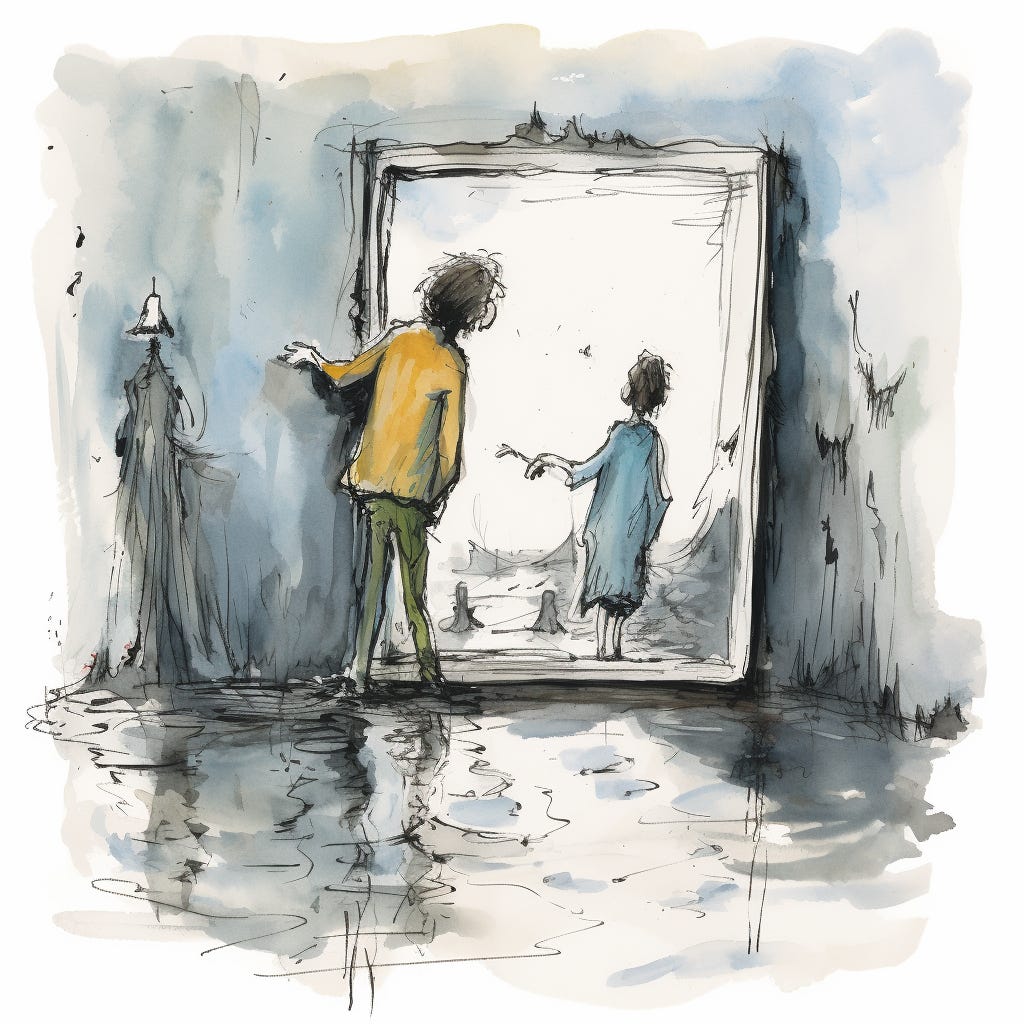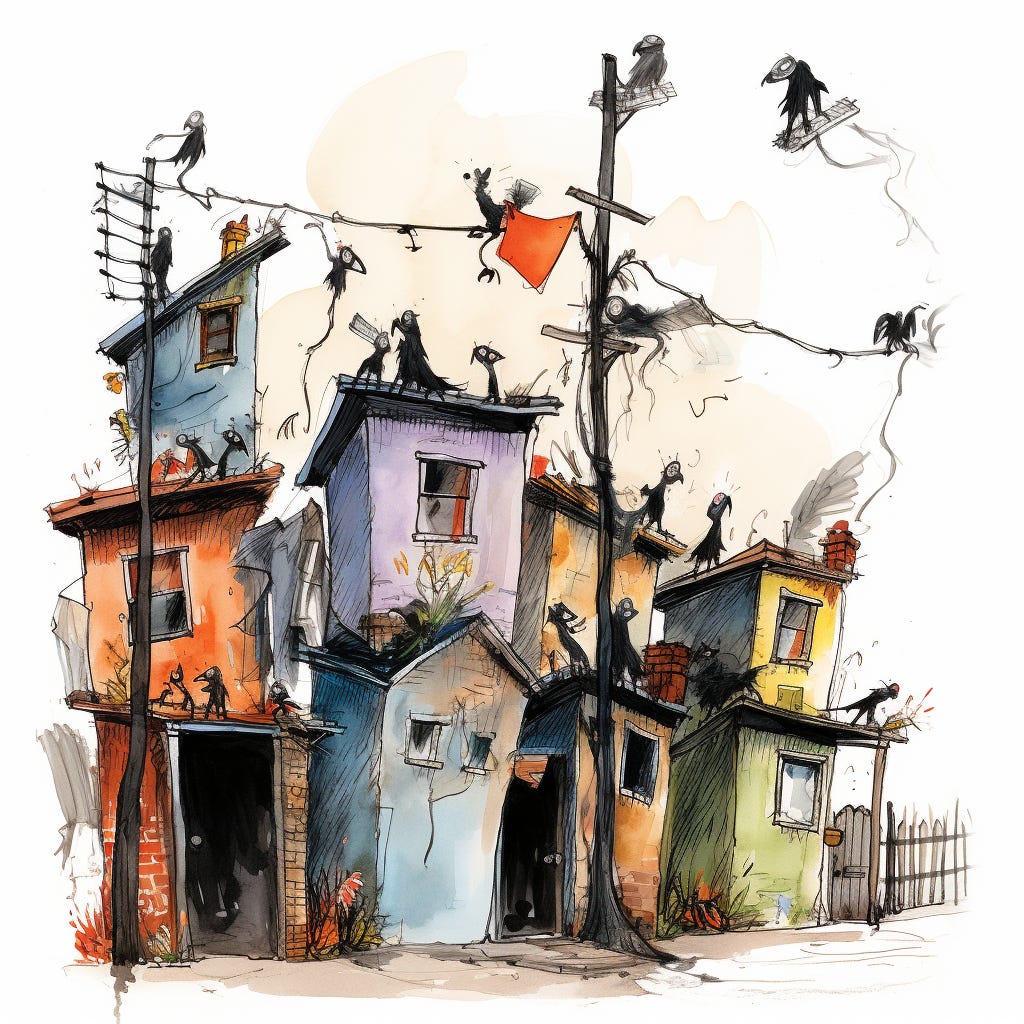The Internet is Spiritual Technology
A rational claim about what humans deem spiritual and what the Internet really is.
Because “spiritual” is in the title, let me begin this article with what it is not. This is not about religious beliefs. It is a rational claim about what we humans deem spiritual and what the Internet is.
Religion and spirituality are observable phenomena. Regardless of the truth of the claims made on behalf of either, these are two statements of fact: (1) Humans practice religions. (2) Humans describe certain experiences and states of consciousness as spiritual
Among (nearly) all spiritual traditions is a common idea—that we share an underlying nature.
If we observe human spirituality from a bird’s eye view, for all of the vast differences between religious teachings and ritual practices, there are some core similarities shared by many.
One such similarity is a consistent teaching about how to relate to the people around us.
New Testament: Love your neighbor as yourself.
Udanavarga: Hurt not others with that which pains yourself.
Sahih Muslim: None of you has faith until he loves for his brother or his neighbor what he loves for himself.
Black Elk, Lakota Holy Man: The first peace, which is the most important, is that which comes within the souls of people when they realize their relationship, their oneness with the universe and all its powers, and when they realize at the center of the universe dwells the Great Spirit, and that its center is really everywhere, it is within each of us.
Marcus Aurelius: What injures the hive, injures the bee.
Among the topics people deem “spiritual,” how we conscious beings relate to one another is central.
Inward technology has more potential to transform the world than outward technology.
When we muse about the rapid evolution of technology, we usually think outward.
The horse and buggy beside a modern Tesla. The 56 years between the Wright brothers’ first flight and the moon landing. The computers in our pockets, orders of magnitude more powerful than those used to facilitate the moon mission.
But for all their complexity, the computers in our pockets are orders of magnitude simpler than the computers made of fat that sit in our skulls.
The amount of progress we humans have made in the last 100 years is astounding. As technology builds on itself, we start to see that the distribution of knowledge and the sharing of information are more important than any individual stride forward.
The connective technology that empowers humans to exchange meaning is as radical as it gets.
Every media has spiritual potential. The Internet is no different.
Experiences people report as spiritual are often sparked by social technology.
At varying points throughout human history, singing and melody, spoken language, and written words were all new social technologies. It’s not controversial to say that songs, poems, and stories can inspire experiences people refer to as spiritual.
The Bible was among the first widespread uses of the freshly-invented printing press. The first commercial radio station broadcast a church choir on Sunday evenings.
If “spiritual” technology is technology that mediates connections between conscious beings, then the Internet is the most revolutionary spiritual technology ever invented.
Even the simplest aspects of life are radically different when knowledge is accessible to everyone.
My grandma recently told me a story about meeting my grandpa’s family for the first time. His mom made a cake to celebrate the occasion, and it was “just the ugliest cake [she’d] ever seen.”
Now, my grandma is the nicest person I’ve ever met, and if she says it was an ugly cake, it was an ugly cake. It made me imagine my great-grandma’s experience of cake baking.
I imagined her tasting a cake at a friend’s house and asking for the recipe. She’d have copied instructions from a page in a recipe book with a pen and paper. Or maybe her friend had simply recited the recipe from memory.
She’d go home to her kitchen, and she’d read her notes. She’d try to remember anything she didn’t write down, and when she had questions, she’d rely on her intuition—or maybe make a phone call if something went really wrong.
She probably didn’t even have a picture to reference.
Then, I imagined trying to make a cake myself. I’d look for recipes recommended by Google. Then I might look for others on Reddit or a recipe site or YouTube or Instagram or TikTok. I’d read the comments submitted by other people who’d tried the recipe and see what their feedback was.
I’d sort for the recipes with the highest ratings. I could find Gordon Ramsay or Anthony Bourdain’s favorite cake recipes and read the reviews on those, too.
If I made a mistake, I could ask questions in communities of other baking hobbyists. If a recipe had a typo, it’d be easy for me to double check. I have a near-infinite source of aesthetic inspiration, suggestions, expert advice, mistake corrections, and alternatives. And it’s accessible to me almost all of the time.
We’re fundamentally different creatures when the expanse of human knowledge is available to each of us through a rectangle in our pockets. And it’s not just our knowledge but our relationships that are increasingly mediated by social technology.
The Internet transforms consciousness.
Hindu scholars have defined spirituality as “awareness of self, the discovery of higher truths, true nature of reality, and a consciousness that is liberated and content.”
Which of these hasn’t been radically changed by the Internet?
How we understand ourselves and our relationship to our community is now largely dictated by the social media through which we interact—and the algorithms that dictate them.
Wikipedia, Google Books, and Audible provide access to nearly every inquiry into “higher truths” that we humans have ever conceived.
Lectures and interviews with the world’s leading physicists and philosophers empower even the least formally educated of us to learn the most informed, rigorously tested theories about the nature of reality.
We joke through gritted teeth about the closed-mindedness of past generations, but we forget just how available the full breadth of human expression is to us today. The Internet exposes us to people who are different from us. Sometimes very different from us.
Past generations lived in smaller worlds filled with people they understood less.
The geographical and socio-economic boundaries that have separated humans for millennia are broken down by the Internet. Is that not a liberation of consciousness at mass scale?
As we open our cultural apertures to the full breadth of humanity, it seems natural that we should feel some growing pains. Among a species estimated to be about 300,000 years old, the Internet is younger than the average US citizen. (35 years and 39 years, respectively.)
Today, we interact with people we’ll never meet in real life. We recognize people who would never recognize us. The wealth of human knowledge is at our fingertips. Those are entirely new experiences for brains 4 billion years in the making.
We ought to have a little patience for ourselves as we recognize just how radically different our relationships are as a result. But we also need to take a critical look at exactly what about our relationships are changing.
Spiritual technology is often hijacked.
Maybe it’s hyperbolic to call Facebook spiritual technology. But even the most shallow social media platform can spark meaningful memories or yield meaningful connections. Social algorithms can introduce us to interests we didn’t know we had or answer questions we hadn’t thought to ask.
Our world and our relationships with one another are already radically different than they were in any pre-Internet phase of culture. It’s hard to argue with the Internet’s high potential for good, but that power has corresponding destructive potential, too.
Social algorithms have the potential to alienate us from our communities by representing views that grab attention rather than signify the norm. What might have been an embarrassing day at school for past generations could become the next viral cringe video today. If something in my feed makes me incredibly angry or sad or upset, my reaction will signal the algorithm to show me more.
Today, the majority of this technology is simply aimed to grab and keep attention. The harm caused by today’s social media is generally a byproduct of for-profit companies in the pursuit of maximizing advertising impressions.
When we aim algorithms at maximizing attention, they don’t necessarily intend to show us things that make us upset. But if something does make us upset and also keeps our attention, it’ll show us more anyway.
Imagine a more sinister aim for these social algorithms.
Imagine an entity in whose interest it may be to polarize a population. Perhaps every so often, the algorithm displays a politically-opposite, highly-polarizing piece of content. Perhaps it subtly increases the frequency of crime-related content or [insert hot button political topic here].
What effect might that have on populations in aggregate? Could that change how we feel about neighbors? Ourselves? How we vote? Where we spend our energy?
As technology becomes more complex, it also becomes more opaque.
When Instagram simply displayed the most recent posts from people we followed, fixing a problem was simple. Don’t like what you see? Unfollow.
Today’s social algorithms are much more complex, and it’s much more difficult for us to control our experiences. That’s a serious vulnerability in an experiment we’re running on ourselves and our children.
Social technology is so much more important than the advertising impressions it generates. As we look back through history, we consider moments of innovation in social technology as among the most important. Shouldn’t we recognize how monumental this new technology is and free it from its advertising profit model?
The Internet transforms human consciousness. That’s not just a hippy aphorism, it’s an observable truth. As a mediator between conscious beings, the Internet is spiritual technology. And we need to start treating it that way.
![[An Internet Reference] Substack](https://substackcdn.com/image/fetch/$s_!euiZ!,w_80,h_80,c_fill,f_auto,q_auto:good,fl_progressive:steep,g_auto/https%3A%2F%2Fsubstack-post-media.s3.amazonaws.com%2Fpublic%2Fimages%2F78b2cc56-f916-4a3b-80a5-60af2115e7bc_400x400.jpeg)














Religion has held people together since the beginning. In a modern mediation process , the program of training can make converts quickly and bring them up to speed. Now put AI in the mix. Collating information from every online source of religious insight (as determined by popularity) and maximizing for popularity. Humanity religiously united by the perfect objectively fair , all knowing peace keeper.
But on the way there, a vicious fight as your programs battle their programs. It sounds pretty spiritual to me. Not all spirits are to be trusted.
Don't think you're wrong. Interesting point but not necessarily very complex ... maybe have to get into the weeds a bit in defining spirituality. But then again you wade out into weeds and you ask yourself; why am I here again? This is just slimey, at best.